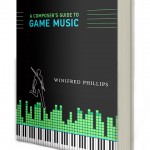Today we will be reviewing the new book from Winifred Phillips a renowned composer for the titles such as God of War, Assassin`s Creed, the Little Big Planet franchise and other cool game titles. You can also check out our interview with Winifred here.
Becoming Lara Croft
 The beginning of the book starts with the explanation of how and what inspired Philips to start working in game music field. It was, as the cover of the book hinted, a game called Tomb Rider (you are probably familiar with it). The story of Winifred in itself is short but inspirational to any composer wanting to get into game music. It was not easy and the author expresses that very clearly in the book. After that simple prologue the author delves into the main content of the book.
The beginning of the book starts with the explanation of how and what inspired Philips to start working in game music field. It was, as the cover of the book hinted, a game called Tomb Rider (you are probably familiar with it). The story of Winifred in itself is short but inspirational to any composer wanting to get into game music. It was not easy and the author expresses that very clearly in the book. After that simple prologue the author delves into the main content of the book.
Case studies
It is hard for me to sum up this book as a whole as it is not an actual text book nor is it a personal story from beginning to the end. There is so much useful information here that can be useful for composers and in between the lines you also get a glimpse of Philips’ life as a composer. The author did a really good job merging those two worlds.
For instance, on one hand you are presented with various philosophical aspects of gamers, you have a great number of musical theories and usually after those theories the author asks important questions to you and herself. How can we use this information as game composers?
On the other hand you find out how Philips used that information to score games like Assassins Creed and similar titles. You really get the best of both worlds and I have really enjoyed that aspect of the book. For me personally reading the book was smooth with some slow parts in between.
While I enjoyed the theories and philosophical questioning, the slow part began when I was presented with some technical aspects of the book like which DAWs, and software are available on the market but I understand why these chapters are there and why they might be helpful to others. I guess that would be a personal preference.
Who should read A composer’s guide to game music
In one word. Everyone (interested in working with games that is). Here is why.
Although the book is primarily intended for beginners it is much more than that. The chapters on the philosophical side of game music are crucial for anyone and, although this is my personal opinion, I don’t think I’m wrong in saying so. As a composer you would be interested in finding out more about your potential clients and users of the game you are scoring (I know I am) and the book definitely brings this aspect to you. Beginners wanting to get into this field will no doubt benefit from information on how to approach producers and how to approach game audio in itself. Beginners will find out all of the technical aspects of scoring music for games such as horizontal and vertical scoring, linear and adaptive music and you will gain knowledge and understanding of game music world. The book is roughly three hundred pages long so it is definitely not a long and boring read.
Conclusion
A composer’s guide to game music is definitely one of the better books I have read on this subject. Philips’ story is, in my opinion, very inspiring and it will inspire you to research the game audio world the whole philosophy of it even further. As I have stated that the book has some slow moments but never the less it is useful information, especially for the beginners.
If you are really interested in game music as a composer you will enjoy this book. If you are game developer you will enjoy this book. Yes, game developers should read it as it will shed some light on what it takes to create good music for your game. If you prefer personal stories than you will enjoy the book too.
A composers guide to game music is therefore and hands down a must have for everyone interested in game music.
Book details:
Hardcover: 288 pages
Publisher: The MIT Press (February 14, 2014)
Language: English
ISBN-10: 0262026643
ISBN-13: 978-0262026642
Price: $22.19
Link: http://www.amazon.com/dp/0262026643/ref=cm_sw_su_dp
– Check out our book section here.
Editor picks:
– Aaron Marks – The Complete Guide to Game Audio
– George “Fat Man” Sanger – The Fat Man on Game Audio
